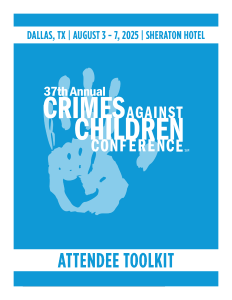Workshop
Marriott
Developmental Considerations in the Forensic Interview (Part 1)
Monday, August 4, 2025
8:00 AM – 9:15 AM CT
Location: Preston
Earn 1.25 Credit Hours
Target Audience: Law Enforcement, Prosecutor, Medical, Forensic Interviewer, CPS, CAC
- CA
Cari Allen
Forensic Interviewer/Program Director
Child Advocacy Center of Jackson County 
Katie Greathouse (she/her/hers)
Program Manager/Child Forensic Interviewer
Mt. Emily Safe Center
Primary Presenter(s)
Co-Presenter(s)
Understanding child/adolescent development is essential for all professionals conducting child forensic interviews. Interviewers who understand child development are better able to make appropriate developmental accommodations for children during the forensic interview. Further understanding development allows interviewers to understand from a developmental perspective a child’s presentation during the forensic interview and may help the interviewer understand developmental challenges the child may face during the interview.
This presentation will provide information and discuss characteristics of children in the following areas of development; language, cognition, and social/emotional development. Information will be presented that will help child forensic interviewers understand how these areas of development impact a child’s ability to participate in and provide information during a forensic interview. Last this presentation through the use of lecture and showing examples of forensic interviews will assist interviewers in understanding developmentally appropriate strategies for interviewing children.
This presentation will provide information and discuss characteristics of children in the following areas of development; language, cognition, and social/emotional development. Information will be presented that will help child forensic interviewers understand how these areas of development impact a child’s ability to participate in and provide information during a forensic interview. Last this presentation through the use of lecture and showing examples of forensic interviews will assist interviewers in understanding developmentally appropriate strategies for interviewing children.
Learning Objectives:
- Identify developmental milestones in language, cognition, and social/emotional development, learn how these areas impact a child's ability to participate in a forensic interview.
- Analyze how a child's developmental stage influences their presentation during a forensic interview, to include communication, comprehension, and social interaction.
- Apply developmentally appropriate interviewing strategies that meet the needs of children at different developmental stages.

